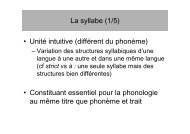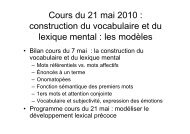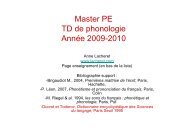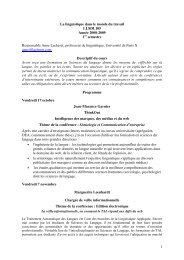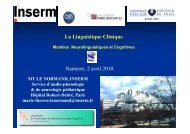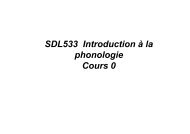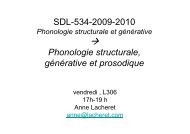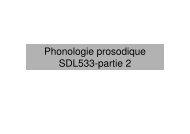Create successful ePaper yourself
Turn your PDF publications into a flip-book with our unique Google optimized e-Paper software.
Third, Othello as a figure in a compelling tragedy has choices to make and<br />
makes them badly, but because we feel sympathy for him we rue those choices. At<br />
every turn, Shakespeare indicates dramatically the “what if…”, the “if only…”, the<br />
contrary-to-fact conditionals that exist (metaphysically) adjacent to the events of the<br />
plot line and give it meaning. We might say, the course of a plot is not a single bole<br />
growing linearly upwards, but a tree whose ghostly branches are the actions not taken,<br />
actions still potent because of the way in which they affect the meaning of the whole.<br />
Thus, we imagine Othello in a different possible world, where he unmasks ‘honest’<br />
Iago, or where Emilia gives him the information that allows him to see through her<br />
husband sooner, or where his love for Desdemona tips him back from the edge of<br />
madness. So we imagine him as the play unfolds, and so we imagine him in retrospect,<br />
and thus supply ‘extra’ content to the figure of Othello. This habit of imagining the<br />
ghostly branches, or re-imagining the bole of Othello’s life-tree, can also precipitate<br />
other plays and novels. Because Othello is a personage, in Martine de Gaudemar’s<br />
sense, he may also be taken up by other writers, who pursue the “what if…?’ by<br />
generating further stories about him; and we are able to identify him across stories.<br />
Fourth, Shakespeare’s Venice was a clear analogue to Shakespeare’s London<br />
then and we can read it as an analogue to our America now. The dialectic of citizen<br />
and Other is central to any political community, all the more so when that political<br />
identity includes some criterion of being open; and the political dialectic filters down<br />
to inform and distort the lives of the people living within it. So Shakespeare’s Venice<br />
is in that sense generic, though the force of its example stems from its unique<br />
geographical and historical position in the late Middle Ages and Renaissance as the<br />
European threshold, across which the treasures of the Middle East (itself the<br />
crossroads of China, India and Africa) were transmitted. Thus audiences from<br />
generation to generation can read their own political and social travails in the vexed<br />
fate of Othello and Shylock.<br />
Fifth, and finally, Cavell reminds us in The Claim of Reason that every<br />
utterance is embedded in a language game; all the disparate language games we<br />
engage in are embedded in a ‘form of life’ (to use one of Wittgenstein’s more<br />
mysterious phrases); and that embeddedness involves our sociable mutuality, our<br />
corporeal life in space and on the earth, as well as our natality / mortality in time. To<br />
use J. L. Austin’s vocabulary, not only is every performative utterance performative,<br />
so is every constative utterance. The mere fact of assertion is what it is only in the<br />
midst of language games and a form of life. That doesn’t mean that there is no point to<br />
logic; but it does mean that logical abstraction is an intentional (and intensional) act.<br />
Vuillemin reminds us that one aspect of that intentionality is metaphysical; Peirce<br />
reminds us that another aspect is pragmatic; Cavell and Austin remind us that another<br />
aspect is rhetorical, in Aristotle’s sense. Thus no utterance is free of metaphysics,<br />
pragmatics, or rhetoric; and philosophical reflection must also inquire into the<br />
relations among these three dimensions.<br />
So when Shylock asks, “Hath not a Jew eyes?” and when Portia exclaims, “The<br />
quality of mercy is not strained,” and when Othello says of Desdemona’s<br />
handkerchief, “There’s magic in the web of it,” we must hear Shakespeare’s voice.<br />
And this is the case even if when Prospero utters the great final speeches of The<br />
Tempest we hear Shakespeare’s voice most clearly and directly, speaking for himself<br />
as a poet. So too we must also hear the actor’s voice, and our own voice, sotto voce,<br />
quietly seconding Othello as he speaks, understanding him, empathizing with him,<br />
quarreling with him, weeping for him and Desdemona. There is a chord of voices<br />
speaking in every word, and it produces something like Bach’s canons as the speeches<br />
63



